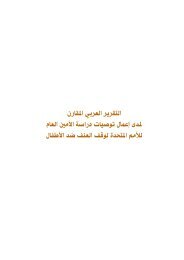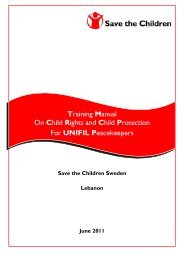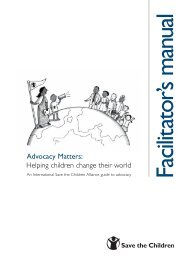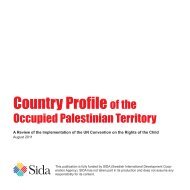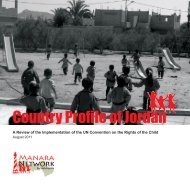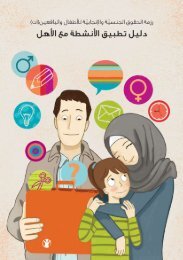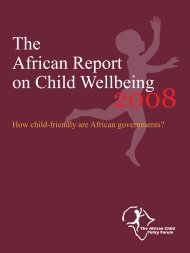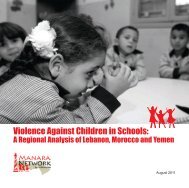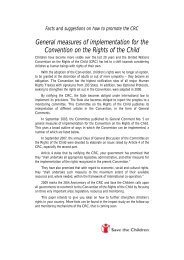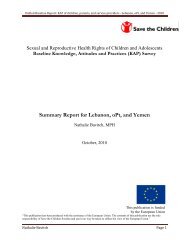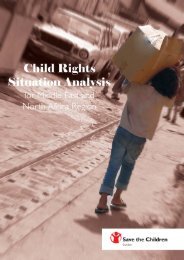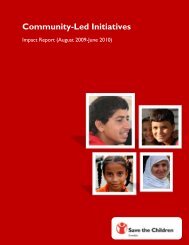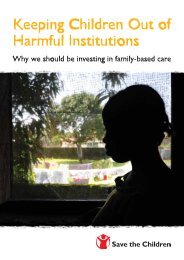Country Profile of Morocco - International Bureau of Children's Rights
Country Profile of Morocco - International Bureau of Children's Rights
Country Profile of Morocco - International Bureau of Children's Rights
You also want an ePaper? Increase the reach of your titles
YUMPU automatically turns print PDFs into web optimized ePapers that Google loves.
“A major domestic<br />
issue is that<br />
<strong>of</strong> unaccompanied<br />
migrant children<br />
commonly called harragas<br />
(children who seek<br />
to migrate to Spain,<br />
France, Italy, etc.).”<br />
31<br />
An interesting initiative put<br />
in place between 2008 and<br />
2010 is a project carried<br />
out by the <strong>International</strong><br />
Organisation for Migrations,<br />
in partnership with<br />
National Mutual Aid. The<br />
“Salem Project”, funded<br />
by the Italian Cooperation,<br />
aims to prevent irregular<br />
migration, especially <strong>of</strong><br />
minors in the Province<br />
<strong>of</strong> Khouribga. The pro-<br />
gramme provides a combination <strong>of</strong> information-sharing,<br />
vocational training and school reintegration. 114<br />
The Orient-Occident Foundation has a programme<br />
dedicated to refugees that <strong>of</strong>fers vocational training and<br />
education. It also holds educational activities for children<br />
and provides access to Moroccan darija classes so they can<br />
integrate the formal education system. 115<br />
e.<br />
Ethnicity or Religion<br />
Although Islam is the <strong>of</strong>ficial religion (practiced by over<br />
90% <strong>of</strong> the population), Moroccans are allowed to practice<br />
other faiths. Article 6 <strong>of</strong> the Constitution stipulates<br />
that Islam is the religion <strong>of</strong> the State but guarantees the<br />
free exercise <strong>of</strong> worship to all. Article 39 guarantees that<br />
no member <strong>of</strong> the Parliament can be prosecuted, arrested,<br />
detained or judged for his/her positions while in <strong>of</strong>fice,<br />
unless any <strong>of</strong> these challenge the monarchy, Islam or the<br />
respect due to the King. According to Article 106, the<br />
monarchic nature <strong>of</strong> the State as well as its dispositions<br />
related to Islam cannot be the object <strong>of</strong> constitutional<br />
review.<br />
Though <strong>Morocco</strong> had previously expressed a sole reservation<br />
against Section 14 <strong>of</strong> the CRC (that recognising the<br />
child’s right to freedom <strong>of</strong> religion), the government lifted<br />
it in 2005. Sources say anecdotally, however, that restrictions<br />
are still in force vis-à-vis this section.<br />
f.<br />
Disabilities<br />
In September 2004, over 1.5 million people living with<br />
disabilities were reported, comprising 5.12% <strong>of</strong> the population<br />
and 15.5% <strong>of</strong> children (9.4% <strong>of</strong> boys and 6.1%<br />
girls) under 16 years <strong>of</strong> age. Only approximately 30% <strong>of</strong><br />
children living with a disability aged between four and 15<br />
years old attend school. School enrolment for the disabled<br />
is three times lower than that <strong>of</strong> children without a disability.<br />
116<br />
The Committee, in its latest Concluding Observations,<br />
recommended that the Government “review the situation<br />
<strong>of</strong> these children in terms <strong>of</strong> their access to suitable<br />
health care, education services and employment opportunities<br />
and allocate adequate resources to strengthen services<br />
for children with disabilities, support their families<br />
and train pr<strong>of</strong>essionals in the field.” 117 It also called for the<br />
State party to ensure proper data collection on children<br />
with disabilities.<br />
While children living with physical disabilities are taken<br />
into account in legislation such as Law No. 14-05 on<br />
conditions for opening and managing welfare institutions,<br />
disabled children do not adequately benefit from<br />
health coverage. In recent years, through the NIDH and<br />
other programmes, special centres and schools have been<br />
established, but their services are generally not affordable<br />
to most families.<br />
Civil society is very active in providing services to children<br />
living with disabilities. The Moroccan Friendship for the



